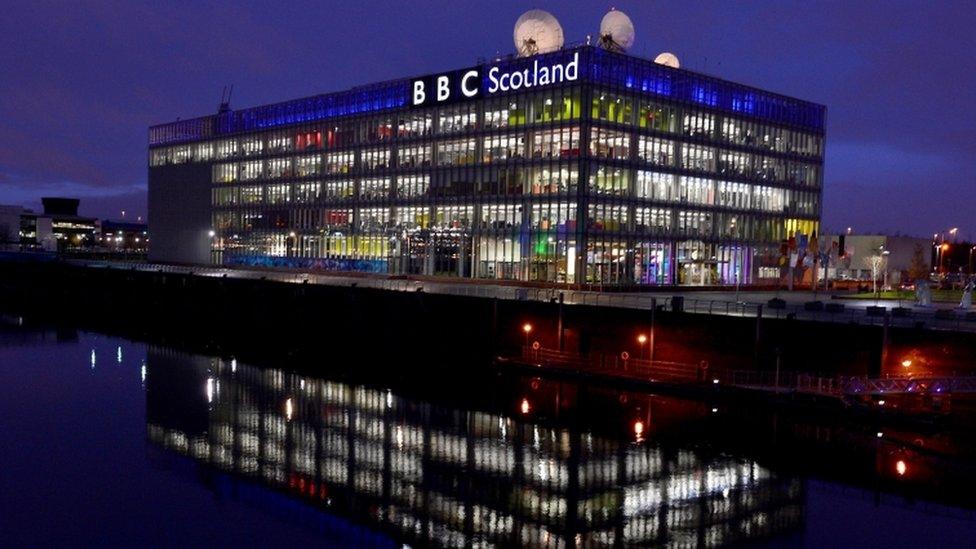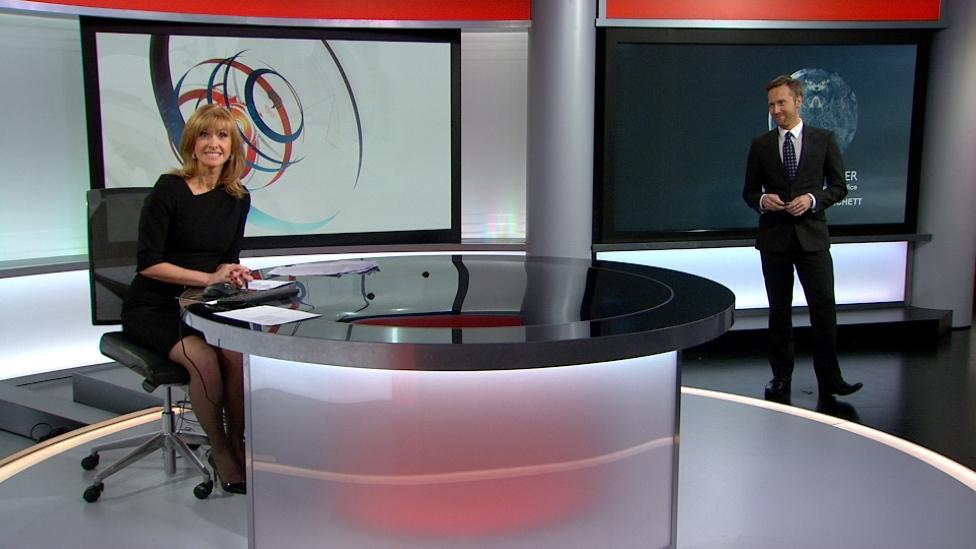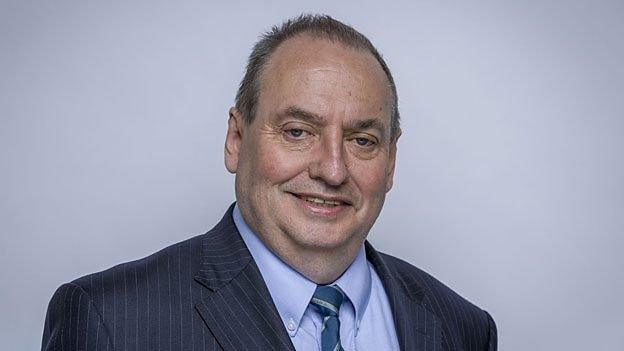BBC to trial 'Scottish Six' programme
- Published

The BBC is to begin trialling a new hour-long news programme that could replace both Reporting Scotland and the Six O'Clock News in Scotland.
The broadcaster has drawn up three options for a new format, but said no decision had yet been taken on which, if any, would be introduced.
The BBC said it aimed to deliver "the very best news" for Scottish audiences.
But the National of Union of Journalists said there had been no consultation with staff.
It is understood that BBC Scotland is to make a series of pilot episodes over the next three weeks before a final decision is taken.
The so-called Scottish Six has been a long-running controversy within Scottish broadcasting, with previous proposals being ruled out by the BBC's then-director general Mark Thompson in 2006.
The proposals are in response to criticism that the BBC's main Six O'Clock News programme often features stories - for example on education and health - that have no relevance to Scottish audiences.
'International news'
The Scottish government has argued that the BBC needs to "catch up" with devolution, and to give its Scottish operation greater control of budgets, staffing and decision making.
The new programme could provide "an hour of UK, Scottish and international news", according to a document drawn up by senior BBC Scotland managers.
It would be edited and presented in Scotland, and would aim to "shape the day's news in a way relevant to Scottish audiences".

The document has stressed that any new programme would not simply be a longer version of Reporting Scotland
The Scottish news hour would also "use the best of BBC News' talent around the country and the world", the document states.
A team of producers would be based at the BBC's New Broadcasting House headquarters in London to ensure key correspondents around the world were available to the Scottish programme.
And about 70 new correspondents, producers and other staff could be recruited to work on the programme.
Possible formats
The document outlines three possible formats for the programme.
The first of these would see an hour-long programme presented entirely in Scotland, while the second would see a main Scottish presenter accompanied by a London-based journalist who would front a 10-minute roundup of UK and international news.
In both options, the document stresses that BBC Scotland would have editorial responsibility for the programme.
A third option would retain the current structure of the Six O'Clock News followed by a half-hour Reporting Scotland.
But the Six would place greater emphasis on explaining how stories differ in different parts of the UK - for example why junior doctors are on strike in England but not Scotland.

The NUJ has said it will put the proposals into dispute unless BBC Scotland director Ken MacQuarrie carries out a full consultation process with staff
And Reporting Scotland would be improved through a "new, more rigorous editorial brief, a focus on more analytical specialist journalism, and higher production values".
The document said focus groups set up around the country had suggested "participants want local news and news from Scotland, and there was also a strong interest in a UK perspective on UK and international stories, and in 'big news' happening around the UK".
It also acknowledged that "support for a Scottish Six was muted" among those taking part in the focus groups, and that "BBC Scotland would have to address perceived quality issues first, and any launch would have to be an immediate success from day one".
It said audience research had suggested that some viewers believed Reporting Scotland was of a lower quality than UK-wide news programmes, and that Scottish news was not covered in sufficient depth.
But the document stressed that any new hour-long programme would not simply be a longer version of the existing Reporting Scotland.
It also said the Audience Council for Scotland had said that more depth and analysis of Scottish news was required, and that the "Scottish Six is a great opportunity which must not be squandered".
'Depth of specialism'
The proposals were discussed by BBC Scotland journalists at an NUJ meeting on Wednesday, with staff expressing concern that they first learned of the plan when details were published in a newspaper on Monday.
There was also anger at the document stating BBC Scotland "has some strong talent but not enough depth of specialism", and that the "ideal" editor of any new programme would have high-level experience of network TV.
The NUJ said this implied that many senior Scottish-based journalists would not be considered experienced enough to edit the programme.
The union has threatened to put the proposals into dispute unless BBC Scotland director Ken MacQuarrie agrees to a full consultation with staff.
BBC Scotland's head of news Gary Smith spoke to staff on Thursday afternoon in an attempt to address the concerns.
A BBC Scotland spokesman said: "We've said very publicly that we are conducting a news review at present and we'll be looking at various different programme formats and carrying out audience research as part of that process.
"We have told our news teams that we will be carrying out some non-broadcast pilots and we'll obviously talk to staff as we proceed with this work and discuss fully any implications on them.
"No decisions on our future output will be taken until that work is concluded, but ultimately our aim is to deliver the very best news for our audiences here in Scotland."